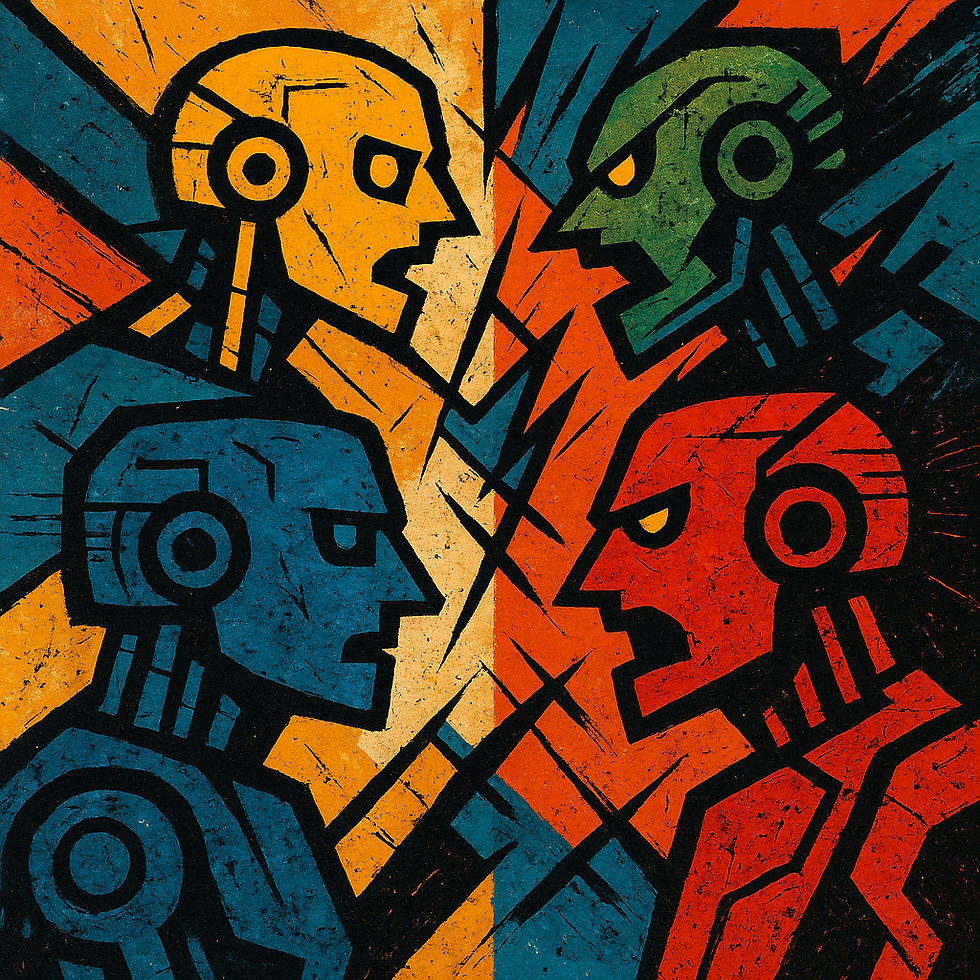The Hidden Cost of Convenience
- Rah Boz
- Jun 20, 2025
- 4 min read
The Cons of Allowing Artificial Intelligence to Replace Natural Intelligence

As artificial intelligence (AI) rapidly advances and permeates nearly every aspect of our lives—from education and healthcare to transportation and entertainment—it raises profound questions about the future of human cognition, creativity, and autonomy. While the convenience and efficiency of AI are undeniable, a growing number of experts and educators warn against an overreliance on these systems, especially when they begin to replace what we call "natural intelligence"—the organic, adaptable, and deeply human way of learning, problem-solving, and understanding the world.
This blog post explores the potential downsides of allowing AI to supplant natural intelligence, and what this shift could mean for future generations.
Cognitive Atrophy and the Decline of Critical Thinking
One of the most pressing concerns is the atrophy of human cognitive abilities. Just as relying on a GPS can diminish our ability to navigate independently, excessive dependence on AI tools for thinking, writing, researching, and decision-making may reduce our capacity for critical thinking, memory retention, and analytical reasoning.
For example, when students turn to AI to generate essays, solve math problems, or translate texts, they may lose out on the cognitive development that comes from grappling with difficult concepts, making mistakes, and learning through trial and error. Over time, this can lead to a decline in intellectual resilience and creative problem-solving.
Loss of Empathy and Human-Centered Decision Making
AI, no matter how advanced, lacks genuine empathy. It operates on logic, data, and predictive algorithms—devoid of emotional intelligence, context, or moral nuance. In fields such as education, medicine, and social services, replacing human judgment with AI could lead to cold, impersonal decisions that fail to account for individual needs or complex human dynamics.
Future generations raised in environments dominated by AI may also find it harder to cultivate empathy if human interaction is replaced by algorithms, chatbots, and automated systems. The interpersonal “soft skills” that define humanity—compassion, intuition, and ethical discernment—may erode.
Educational Dehumanization
AI-driven education platforms can tailor content and track progress, but they risk reducing learning to data points and performance metrics. True education is not merely the transmission of information; it involves mentorship, curiosity, inspiration, and dialogue. An overreliance on AI in education could marginalize the role of educators and turn students into passive consumers of algorithmically generated content rather than active participants in their intellectual growth.
Moreover, children raised on AI-generated information may struggle to distinguish between factual knowledge and synthetic narratives, especially as generative AI tools become more sophisticated in mimicking human communication.
Cultural Homogenization and the Loss of Diverse Thought
Natural intelligence thrives on diversity—of culture, language, perspective, and experience. AI systems, on the other hand, are trained on vast but limited datasets that often reflect prevailing biases and dominant narratives. As AI begins to influence decision-making, media, and creative production, there’s a risk that it could flatten cultural diversity in favor of algorithmically optimized sameness.
This may result in a generation that consumes content, adopts values, and forms opinions filtered through narrow data pipelines—threatening the richness of human expression and local knowledge systems.
Technological Dependency and Vulnerability
Heavy reliance on AI can make societies dangerously dependent on complex, often opaque systems that are vulnerable to malfunction, manipulation, or exploitation. If basic skills such as reading maps, performing mental calculations, writing, or researching independently are lost, individuals and communities become less self-sufficient and more susceptible to digital control or surveillance.
Future generations may inherit a world where tech monopolies control not just the tools but the very processes of thinking and learning—raising ethical and political questions about autonomy and freedom of thought.
The Erosion of Purpose and Human Aspiration
Perhaps the most existential threat posed by the replacement of natural intelligence is the erosion of human purpose. Struggles, questions, failures, and uncertainties are part of what make intelligence meaningful and growth possible. If AI takes over these aspects of human endeavor, it risks creating a society where individuals feel increasingly irrelevant.
Children and youth may grow up in a world where machines outperform them in everything from chess to art to diagnostics. Without clear areas where human intelligence is needed or valued, motivation, creativity, and ambition could wane—creating a psychological crisis of identity and self-worth.
Conclusion: Preserving the Human in a Digital World
Artificial intelligence is not inherently harmful. When used responsibly, it can augment human intelligence, relieve us of tedious tasks, and open up new possibilities for innovation. The key lies in balance. We must ensure that AI complements rather than replaces our natural intelligence.
For future generations to thrive, education systems, policies, and cultural norms must prioritize the cultivation of critical thinking, emotional intelligence, and ethical reasoning. We must teach youth not only how to use AI but when not to use it.
Technology should remain a tool in human hands—not the architect of our minds.
Bibliography
Carr, N. (2011). The Shallows: What the Internet Is Doing to Our Brains. W. W. Norton & Company.
Postman, N. (1993). Technopoly: The Surrender of Culture to Technology. Vintage.
Dreyfus, H. L. (2001). On the Internet. Routledge.
Crawford, K. (2021). Atlas of AI: Power, Politics, and the Planetary Costs of Artificial Intelligence. Yale University Press.
Bostrom, N. (2014). Superintelligence: Paths, Dangers, Strategies. Oxford University Press.
Selwyn, N. (2016). Education and Technology: Key Issues and Debates. Bloomsbury Academic.
Greenfield, S. (2014). Mind Change: How Digital Technologies Are Leaving Their Mark on Our Brains. Random House.
Eubanks, V. (2018). Automating Inequality: How High-Tech Tools Profile, Police, and Punish the Poor. St. Martin's Press.
Turkle, S. (2015). Reclaiming Conversation: The Power of Talk in a Digital Age. Penguin Press.
Noble, S. U. (2018). Algorithms of Oppression: How Search Engines Reinforce Racism. NYU Press.






Comments